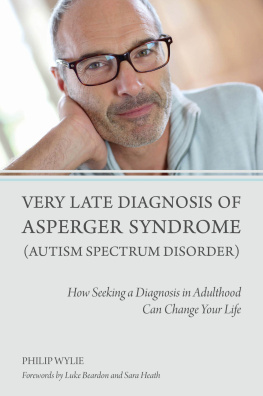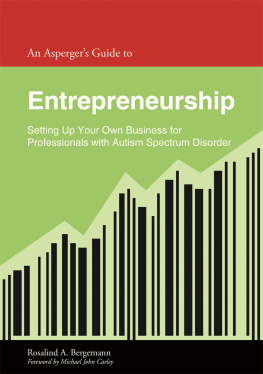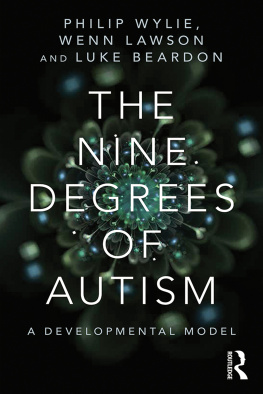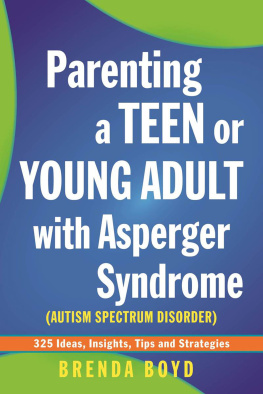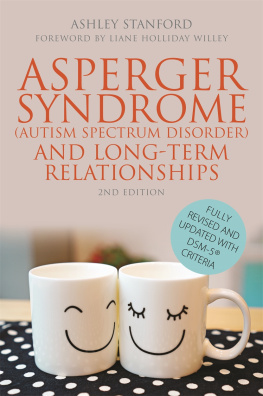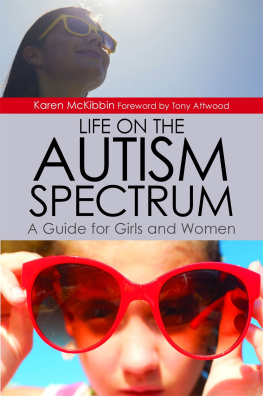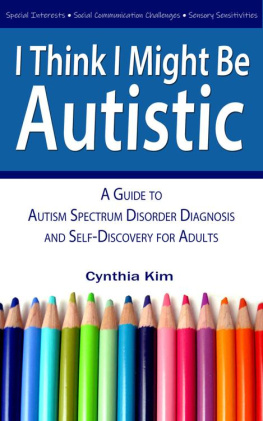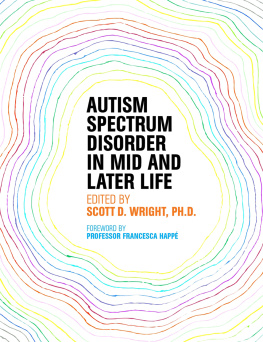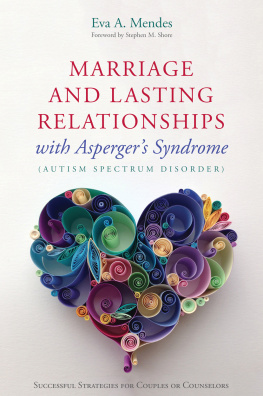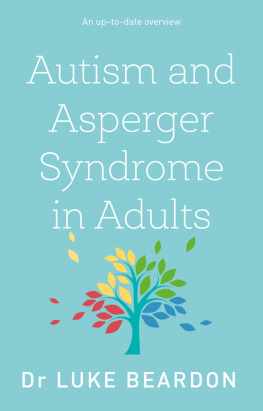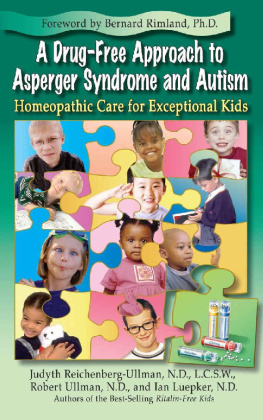Wylie Philip - Very Late Diagnosis of Asperger Syndrome (Autism Spectrum Disorder)
Here you can read online Wylie Philip - Very Late Diagnosis of Asperger Syndrome (Autism Spectrum Disorder) full text of the book (entire story) in english for free. Download pdf and epub, get meaning, cover and reviews about this ebook. year: 2014, publisher: Jessica Kingsley Publishers, genre: Religion. Description of the work, (preface) as well as reviews are available. Best literature library LitArk.com created for fans of good reading and offers a wide selection of genres:
Romance novel
Science fiction
Adventure
Detective
Science
History
Home and family
Prose
Art
Politics
Computer
Non-fiction
Religion
Business
Children
Humor
Choose a favorite category and find really read worthwhile books. Enjoy immersion in the world of imagination, feel the emotions of the characters or learn something new for yourself, make an fascinating discovery.
- Book:Very Late Diagnosis of Asperger Syndrome (Autism Spectrum Disorder)
- Author:
- Publisher:Jessica Kingsley Publishers
- Genre:
- Year:2014
- Rating:5 / 5
- Favourites:Add to favourites
- Your mark:
- 100
- 1
- 2
- 3
- 4
- 5
Very Late Diagnosis of Asperger Syndrome (Autism Spectrum Disorder): summary, description and annotation
We offer to read an annotation, description, summary or preface (depends on what the author of the book "Very Late Diagnosis of Asperger Syndrome (Autism Spectrum Disorder)" wrote himself). If you haven't found the necessary information about the book — write in the comments, we will try to find it.
Wylie Philip: author's other books
Who wrote Very Late Diagnosis of Asperger Syndrome (Autism Spectrum Disorder)? Find out the surname, the name of the author of the book and a list of all author's works by series.
Very Late Diagnosis of Asperger Syndrome (Autism Spectrum Disorder) — read online for free the complete book (whole text) full work
Below is the text of the book, divided by pages. System saving the place of the last page read, allows you to conveniently read the book "Very Late Diagnosis of Asperger Syndrome (Autism Spectrum Disorder)" online for free, without having to search again every time where you left off. Put a bookmark, and you can go to the page where you finished reading at any time.
Font size:
Interval:
Bookmark:

There is an increasing number of adults who have a diagnosis of Asperger syndrome in their mature years. This new book will help explain past experiences, provide self-understanding and give guidance as to the future. People who have recently achieved a diagnosis, family members and clinicians will find the descriptions and advice invaluable.
Tony Attwood, PhD, Clinical Psychologist, Minds & Hearts Clinic, Australia, and author of The Complete Guide to Aspergers Syndrome
Philip Wylie has captured the true essence of living with Asperger syndrome. Many people spend the majority of their lives wondering why they are different and never fit in. Broken relationships, loss of jobs, and being preyed upon by those who see our vulnerability and lack of assertiveness are all part of the process. In turn, we develop low self-esteem and suffer many consequences. Getting diagnosed can help turn these negatives into positives. No matter how late in life you discover that you have Aspergers, there is still room for repair. Wylie points out that receiving a diagnosis can have either positive or negative effects, and what to be prepared for in either case. Self-acceptance is the key. You are then free to embark upon a new life. Within these pages is advice for what happens next after receiving your diagnosis. Wylie helps guide you through the process, to come out seeing the light at the end of the tunnel. That light will help guide you to a better life after learning you are on the autism spectrum!
Anita Lesko, Founder and Executive Director of the Flying High with Autism Foundation, editor of Been There. Done That. Try This! and author of Aspergers Syndrome: When Life Hands You Lemons, Make Lemonade
A timely accurate resource for discovering if you fit the bill for autism. How I wish this treasure of a resource had been available during my own journey! This important guide for adults cuts to the chase. It potentially opens all the right doors.
Wenn Lawson, Psychologist, Counsellor, Social Worker, author and autism advocate
VERY LATE DIAGNOSIS OF ASPERGER SYNDROME (AUTISM SPECTRUM DISORDER)
of related interest
The Complete Guide to Aspergers Syndrome
Tony Attwood
ISBN 978 1 84310 495 7 (hardback)
ISBN 978 1 84310 669 2 (paperback)
eISBN 978 1 84642 559 2
Coming Out Asperger
Diagnosis, Disclosure and Self-Confidence
Edited by Dinah Murray
ISBN 978 1 84310 240 3
eISBN 978 1 84642 450 2
Been There. Done That. Try This!
An Aspies Guide to Life on Earth
Edited by Tony Attwood, Craig R. Evans and Anita Lesko
ISBN 978 1 84905 964 0
eISBN 978 0 85700 871 8
Asperger Syndrome and Anxiety
A Guide to Successful Stress Management
Nick Dubin
Foreword by Valerie Gaus
ISBN 978 1 84310 895 5
eISBN 978 1 84642 922 4
The Autism Spectrum and Depression
Nick Dubin
Foreword by Tony Attwood
ISBN 978 1 84905 814 8
eISBN 978 0 85700 242 6
AutiPower!
Successful Living and Working with an Autism Spectrum Disorder
Herman Jansen and Betty Rombout
ISBN 978 1 84905 437 9
eISBN 978 0 85700 869 5
VERY LATE DIAGNOSIS OF ASPERGER SYNDROME (AUTISM SPECTRUM DISORDER)
How Seeking a Diagnosis in Adulthood Can Change Your Life
PHILIP WYLIE
Forewords by Luke Beardon and Sara Heath

Jessica Kingsley Publishers
London and Philadelphia
The Autism Spectrum Quotient (AQ) in the Appendix is reproduced from Baron-Cohen et al. 2001 with the kind permission of the Autism Research Centre at Cambridge.
First published in 2014
by Jessica Kingsley Publishers
73 Collier Street
London N1 9BE, UK
and
400 Market Street, Suite 400
Philadelphia, PA 19106, USA
www.jkp.com
Copyright Philip Wylie 2014
Forewords copyright Luke Beardon, Sara Heath 2014
All rights reserved. No part of this publication may be reproduced in any material form (including photocopying or storing it in any medium by electronic means and whether or not transiently or incidentally to some other use of this publication) without the written permission of the copyright owner except in accordance with the provisions of the Copyright, Designs and Patents Act 1988 or under the terms of a licence issued by the Copyright Licensing Agency Ltd, Saffron House, 610 Kirby Street, London EC1N 8TS. Applications for the copyright owners written permission to reproduce any part of this publication should be addressed to the publisher.
Warning: The doing of an unauthorised act in relation to a copyright work may result in both a civil claim for damages and criminal prosecution.
Library of Congress Cataloging in Publication Data
A CIP catalog record for this book is available from the Library of Congress
British Library Cataloguing in Publication Data
A CIP catalogue record for this book is available from the British Library
ISBN 978 1 84905 433 1
eISBN 978 0 85700 778 0
To the well-being and independence of late-diagnosed autistic adults
DISCLAIMER
Asperger syndrome, which has been reclassified as autism spectrum disorder (ASD) by the American Psychiatric Association in the fifth edition of the Diagnostic and Statistical Manual of Mental Disorders ( DSM-5 ), is a highly diverse neurological condition that affects individuals in many different ways. The characteristics of ASD both gifts and impairments vary massively, so not all of the information in this guide will be applicable to everyone. This book applies to the late diagnosis of potentially hidden neurological conditions, including Asperger syndrome (ASD). The diagnosis, which follows self-identification, is potentially lethal without accompanying psychological, emotional and financial support; however, with adequate and appropriate support, a diagnosis can positively change your life.
CONTENTS
FOREWORD
Getting a diagnosis of Asperger syndrome (AS) or autism can be a traumatic time for many people it can also be a joyful time, a time of relief, of sudden epiphany-esque understanding, the starting point of a bereavement process, or absolute mystification. It can even be a combination of all of these. However, what has been rarely investigated is what a diagnosis (or, as I prefer it, identification) of AS means to someone who has already lived most of their life, and has stumbled across their identity very late on in life.
An identification of AS can mean so many different things to so many people; indeed, it would seem sensible to suggest that the heterogeneity of the population is such that each person will react in his or her own, unique, manner. However, this does not detract from what Philip has set out to do in this book, which is to identify many of the common themes that are associated with a very late diagnosis of Asperger syndrome. While not all of these themes and not all of the content will be 100 per cent pertinent to every reader, there is an excellent chance that much of what has been written will be applicable to most especially those who themselves have had a very late diagnosis of AS.
Asperger syndrome is extraordinarily misunderstood. It is often very misunderstood by clinical professionals, and is often very misunderstood by the general public. This can cause immense distress to so many individuals who have AS, not least in their struggle to get a formal identification. Not all people who get a very late diagnosis will have gone through a struggle to actually get a confirmed diagnosis, but I suspect a lot will. This, in itself, is harmful for many people along with many of the diagnostic practices that can be patronizing, demeaning, medically based, and all about identifying weaknesses or impairments. The post-diagnostic support should be part of the diagnostic process itself. Anyone involved in the diagnostic pathway should be treating the individual with the respect they deserve, as opposed to as a patient who needs assessing. Ascertaining whether an individual has the fascinating cognitive style associated with AS should be a privilege and diagnosticians should take note of that fact. Sadly, this is not often the case, and individuals are made to feel somehow less of a human being. This has huge implications for how a diagnosis is subsequently dealt with by the individual. Indeed, for someone who has spent most of his or her life without a diagnosis, it could be argued that this identification process should be handled with even greater sensitivity than with anyone else. Again, sadly, this is not always the case.
Next pageFont size:
Interval:
Bookmark:
Similar books «Very Late Diagnosis of Asperger Syndrome (Autism Spectrum Disorder)»
Look at similar books to Very Late Diagnosis of Asperger Syndrome (Autism Spectrum Disorder). We have selected literature similar in name and meaning in the hope of providing readers with more options to find new, interesting, not yet read works.
Discussion, reviews of the book Very Late Diagnosis of Asperger Syndrome (Autism Spectrum Disorder) and just readers' own opinions. Leave your comments, write what you think about the work, its meaning or the main characters. Specify what exactly you liked and what you didn't like, and why you think so.

